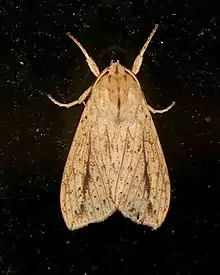Leucanopsis longa
Leucanopsis longa, the long-streaked tussock moth or long-streaked halisidota, is a moth of the family Erebidae. It was described by Augustus Radcliffe Grote in 1880. It is found from North Carolina to Florida and west along the coast to eastern Texas.[2] The habitat consists of marshes and wet sedge meadows.
| Leucanopsis longa | |
|---|---|
 | |
| Scientific classification | |
| Kingdom: | Animalia |
| Phylum: | Arthropoda |
| Class: | Insecta |
| Order: | Lepidoptera |
| Superfamily: | Noctuoidea |
| Family: | Erebidae |
| Subfamily: | Arctiinae |
| Genus: | Leucanopsis |
| Species: | L. longa |
| Binomial name | |
| Leucanopsis longa | |
| Synonyms | |
| |
The wingspan is 38–48 mm. The forewings are light orangish yellow, speckled with brown. The hindwings are whitish. Adults are on wing year round in Florida.
The larvae probably feed on grasses, including marsh grass.[3]
References
- Savela, Markku. "Leucanopsis longa (Grote, 1880)". Lepidoptera and Some Other Life Forms. Retrieved August 8, 2018.
- "930376.00 – 8217 – Leucanopsis longa – Long-streaked Tussock Moth – (Grote, 1880)". North American Moth Photographers Group. Mississippi State University. Retrieved August 8, 2018.
- McLeod, Robin (September 12, 2013). "Species Leucanopsis longa - Long-streaked Tussock Moth - Hodges#8217". BugGuide. Retrieved August 8, 2018.
- Pitkin, Brian & Jenkins, Paul. "Search results Family: Arctiidae". Butterflies and Moths of the World. Natural History Museum, London.
This article is issued from Wikipedia. The text is licensed under Creative Commons - Attribution - Sharealike. Additional terms may apply for the media files.